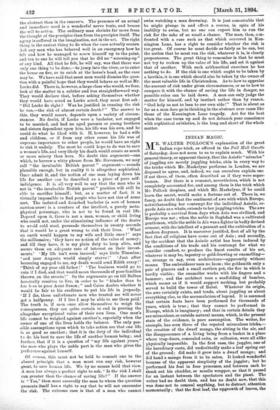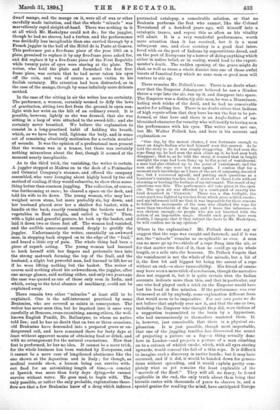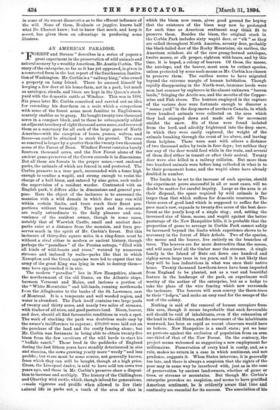INDIAN MAGIC.
MR. WALTER POLLOCK'S explanation of the great Indian rope trick, as offered in the Pall Mall Gazette of Saturday, does not seem to us to explain much. With his general theory, or apparent theory, that the Asiatic " miracles" of juggling are merely juggling tricks, akin in every way to the tricks which Mr. Maskelyne performs in London, we are disposed to agree, and, indeed, we can ourselves explain one if not three, of them, often described as if they were super- human. But there is a remanet, nevertheless, which is not completely accounted for, and among them is the trick which Mr. Pollock despises, and which Mr. Maskelyne, if he could learn the secret, would make a fortune out of. There is, we fancy, no doubt that the sentiment of awe with which Europe, notwithstanding her contempt for the individual Asiatic, re- gards Asia as a whole, extends to her juggling tricks. The awe is probably a survival from days when Asia was civilised, and Europe was not ; when the noble in Baghdad was a cultivated gentleman, while the noble in Aix was a fighter in badly devised armour, with the intellect of a peasant and the cultivation of a modern drayman. It is moreover justified, first of all by the fact that all religions have come out of Asia ; and secondly, by the accident that the Asiatic artist has been induced by the conditions of his trade and his contempt for what we consider comfort, to produce the finest results of his art, whatever it may be, tapestry or gold-drawing or enamelling— or, strange to say, even architecture—apparently without means. The embroiderer uses no loom ; the goldsmith only a pair of pincers and a small earthen pot, the fire in which is hardly visible; the enameller works with his fingers and a hammer; and the architect uses a scaffolding of bamboo, which seems as if it would support nothing, but probably served to build the tower of Babel. Whatever its origin, the awe certainly exists, and tends, about juggling as about everything else, to the accumulation of legend. It is assumed that certain feats have been performed for thousands of years, which is true ; that they cannot be performed in Europe, which is imaginary; and that in certain details they are miraculous, or outside natural means, which, in the piesent state of the evidence, is pure assumption. The writer, for example, has seen three of the reputed miraculous tricks,— the creation of the dwarf mango, the sitting in the air, and the disappearance of a living being from a basket in a place where trap-doors, concealed exits, or collusion, were all alike physically impossible. In the first case, the juggler, one of the hereditary caste, did undoubtedly make a leaf spring out of the ground ; did make it grow into a dwarf mango ; and did hand a mango from it to be eaten. It looked wonderful because of the apparent simplicity of the juggler; but he performed his feat in four processes, and between each he shook out his chudder, or muslin wrapper, so that it passed for an instant between the spectators and the plant. The writer had no doubt then, and has no doubt now, that this was done not to conceal anything, but to distract attention momentarily ; that the first leaf, the npgrowth of leaves, the
dwarf mango, and the mango on it, were all of wax or other carefully made imitation, and that the whole " miracle" was marvellously rapid sleight-of-hand. There was nothing in it at all which Mr. Maskelyne could not do ; for the juggler, though he had no sleeves, had a turban, and the performance was decidedly less inexplicable than one carried through by a French juggler in the hall of the Hotel de la Poste at Geneva. This performer put a five-franc piece of the year 1865 on a plate, promised to replace it by any five-franc piece asked for, and did replace it by a five-franc piece of the First Republic while twenty pairs of eyes were staring at the plate. The writer, who held the plate and furnished the first five- franc piece, was certain that he had never taken his eyes tiff the coin, and was of course a mere victim to his foolish certainty. His attention had been distracted, as in the case of the mango, though by some infinitely more delicate method.
In the case of the sitting in air the writer has no certainty. The performer, a woman, certainly seemed to defy the laws of gravitation, sitting two feet from the ground in open sun- light with her wrist on the hilt of an ordinary sword. It is possible, however, lightly as she was dressed, that she was sitting in a loop of wire attached to the sword-hilt ; and she certainly never breathed. We believe the explanation to consist in a long-practised habit of holding the breath, which, as we have been told, lightens the body, and in some art of remaining absolutely motionless for a certain number of seconds. It was the opinion of a professional man present that the woman was in a trance, but there was certainly nothing miraculous about the feat, though it seemed at the moment nearly inexplicable.
As to the third trick, the vanishing, the writer is certain. A juggler stepped at Madras on to the deck of a Peninsular and Oriental Company's steamer, and offered the company assembled, who were lounging about highly bored by the old method of coaling, if they would subscribe, to show them some- thing better than common juggling. The collection, of course, was forthcoming at once ; he cleared a space on the deck, and told his wife to lie down. The young woman, who may have weighed seven stone, but more probably six, lay down, and her husband placed over her a shallow flat basket, with a handle at the back, exactly resembling the baskets used for vegetables in East Anglia, and called a "frail." Then, with a light and graceful gesture, he took up the basket, and laid it down two or three feet off. The woman had vanished, and the audible amazement seemed deeply to gratify the juggler. Unfortunately the writer, essentially an awkward man, in stepping back stepped on to the edge of the "frail," and heard a little cry of pain. The whole thing had been a piece of superb acting. The young woman had learned to hook herself with her fingers and prehensile toes into the strong matwork forming the top of the frail, and the husband, a slight but powerful man, had learned to lift her as if he were lifting nothing but the basket. The writer of course said nothing about his awkwardness, the juggler, after one savage glance, said nothing either, and only two years ago the case was quoted as one of those only seen in India, and which, owing to the total absence of machinery, could not be -explained away.
There remain two other "miracles" at least still to be explained. One is the self-interment practised by some Brahmins, who are revered as saints in consequence. The writer has never seen this, but he inquired into it once very ..carefully at Benares, cross-examining, among others, the well- known English Pundit, Dr. Ballantyne, to whom no native told lies ; and he has no doubt that on two or three occasions, old Brahmins have descended into a prepared grave or un- derground cell, and have remained there for forty days at least without apparent means of obtaining food or drink, and with no arrangement for the natural evacuations. How that feat is performed, he has no idea. It cannot be a mere trick, for the whole business has been watched by Europeans, and it cannot be a mere case of lengthened abstinence like the one shown at the Aquarium and in Italy ; for though, as medical records show, a human being can survive with- out food for an astonishing length of time,—a convict at Ipswich was more than forty days dying,—he cannot survive without water. He goes mad, to begin with. The .only possible, or rather the only probable, explanations there- fore are that a few Brahmins know of a drug which induces protracted catalepsy, a conceivable solution, or that no Brahmin performs the feat who cannot, like the Colonel Townsbend of a hundred years ago, will himself into a cataleptic trance, and repeat this as often as his vitality will admit. It is a very wonderful performance, worth
more attention than it has received, but it is a most infrequent one, and close scrutiny is a good deal inter- fered with on the part of Indians by superstitions dread, and on the part of Europeans by a horror of doing anything which
either in native belief, or in reality, would lead to the experi- menter's death. The sudden opening of the grave might do that, as well as rouse a whole district into one of those awful bursts of fanatical fury which no sane man or good man will venture to stir up.
There remains Mr. Pollock's case. There is no doubt what- ever that the Emperor Jehangeer believed he saw a Hindoo throw a rope into the air, run up it, and disappear into space. The Emperor was a distinctly able man, he was a Mussulman, hating such tricks of the devil, and he had no conceivable motive for telling lies. There is no doubt either that Indians of high repute affirm that they have known the feat to be per- formed, or that here and there is an Anglo-Indian of un- blemished character for veracity who will testify to having seen the performance with his eyes. The writer never met one, but Mr. Walter Pollock has, and here is his account and explanation :—
" One day, by the merest chance, I was fortunate enough to meet an Anglo-Indian who had himself seen this marvel. As he told the story to us it was simply staggering. He had seen the rope flung up, he had seen the man climb up it, he had seen both disappear ; that is, as he told the story, it seemed that in bright sunlight the rope had been flung up to the point of vanishment, a man had also climbed up to the point of vanishment, and the man and the rope were not seen again. I confess that for a moment such knowledge as I have of the art of conjuring deserted me; but I recovered myself, and putting such questions as a barrister's training teaches him, I arrived at these facts without alarming or hurting the feelings of my informant. The result of my questions was this. The performance did take place in the open air. The open air was afforded by a court-yard of exactly the kind described in ' Pickwick.' There was a dim twilight, the court-yard was lighted by torches from which arose a thick smoke ; and my informant told me that it was impossible for those reasons to follow the movements of the man who climbed the rope for more than two-thirds of the way, and I leave the inference—it was obvious enough—to people who are not besotted with the notion of an impossible magic. Should such people have even doubts, I imagine that if they submit the facts to Mr. Maskelyne, he will confirm me in my opinion."
Where is the explanation ? Mr. Pollock does not say or suggest that the rope was caught and fastened; and if it was
not, the " miracle" remains as inexplicable as ever. A man can no more go up two-thirds of a rope flung into the air, or
for that matter two feet of it, than he could go up its whole length, or a mile into the heavens. Mr. Pollock forgets that the vanishment is not the whole of the miracle, but a bit of it, the first bit and biggest bit being the ascent of a rope without an end,—a sheer impossibility. His friend of course may have seen a mere trick of acrobat ism, though the narrative does not suggest it, but it is quite certain that the Indian accounts indicate more than this, and that in particular, any one who had played such a trick on the Emperor would have lost his head in five minutes. If the performance was ever witnessed at all by anybody, some explanation different from that would seem to be imperative. For our own parts we do not believe that anybody ever saw it, and that the one or two, including the Emperor who thought they did, were victims of a suggestion transmitted to the brain by a hypnotiser,
who had unconsciously to themselves mastered them. It is, however, just conceivable that there is a physical ex-
planation. It is just possible, though most improbable, that one of the juggling families has discovered the secret of projecting a picture on a fog—a thing actually done here in London—and projects a picture of a man climbing on to a column of whitish smoke, which, with all eyes staring upwards, would conceal the fall of a thin rope. It is difficult to imagine such a discovery in native bands ; but it may have occurred, and if it did, it would be handed down for genera- tions without spreading, and it would explain pretty com- pletely what as yet remains the least explicable of the " marvels of the East." They will all. we fancy, be found explicable in the end, the only truth about them being that hieratic castes with thousands of years to observe in, and a special genius for reading the mind, have anticipated Europe in some of its recent discoveries as to the effluent influence of the will. None of them, Bi ahmin or juggler, knows half what Dr. Charcot knew; but to know that much, and keep it secret, has given them an advantage in producing some illusions.




































 Previous page
Previous page